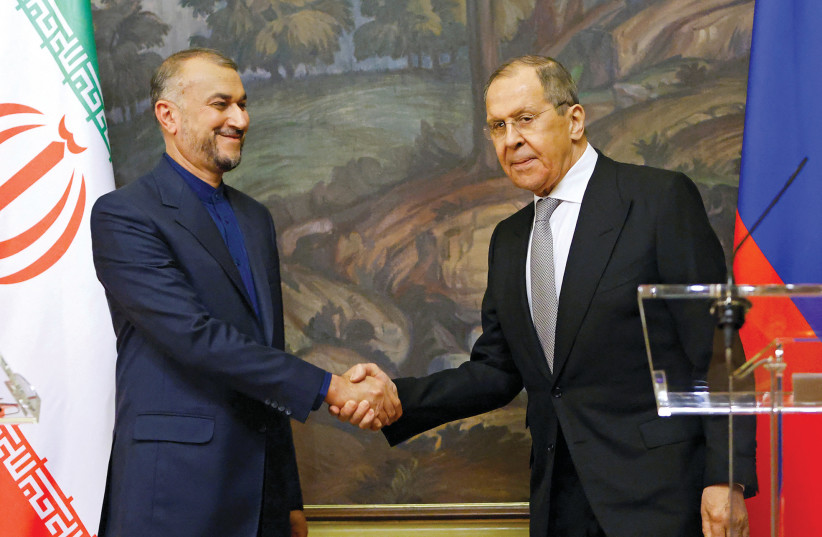Imagine if Ukraine had 1,700 nuclear warheads at its disposal today because it had not surrendered them in 1994 – in exchange for supposedly-binding promises of peace and territorial integrity from Russia, America and the world. Admittedly, history is a river; you cannot isolate one current. Had Ukrainians resisted the American and Russian pressure then, Ukraine might be a rogue state today. Still, as they dodge another Russian missile, fight tanks with pistols, remove more corpses from rubble or flee their homes, historically-minded Ukrainians must be thinking, “Boy, were we suckers,” as sober-minded Israelis sadly agree.
After the Soviet Union collapsed in 1991, Ukraine controlled one-third of the USSR’s nukes. Bruising negotiations led Ukraine to relinquish the world’s third-largest nuclear arsenal. Years before this Putin-triggered invasion, one Ukrainian website called the Budapest Memorandum, which also neutralized the nuclear powers of Belarus and Kazakhstan, “the Greatest Treason in Ukrainian History.”
The international community’s impotence, and the irrelevance of promises made 28-years-ago, haunts Israelis. Despite Volodymyr Zelensky’s inaccurate Holocaust shaming, most Israelis have rallied with the rest of the Jewish community and the West to support Ukraine – sidestepping without sanitizing Ukraine’s blood-drenched Jew-hating past. But for most Israelis, Vladimir Putin’s war has stirred this rarely mentioned but ever-present anxiety that our little Promised Land paradise could become a warzone instantaneously.
We all know: Ukraine could happen here and we would be on our own far more than Ukraine because even some of our best friends would blame us, soft-pedaling our enemies’ enmity, deeming our tragedy self-inflicted.
Israel is super-skittish because as the Russian bloodbath grows despite impressive Western sanctions and massive arms shipments. The United States seems to be succumbing to Iranian charms again. Whenever someone from or for President Joe Biden’s administration says Putin’s aggression proved that you must take dictators’ threats seriously, I want to scream, “What about Iran?!”

How do those murderous Mullahs keep fooling so many Americans? It’s particularly mystifying to watch many liberals go soft on these thugs. Talk about politically incorrect! These Iranian dictators weaponize religion. They oppress women, torture dissidents and execute gays. The Iranian Revolutionary Guards Corps (IRGC) drain Iran’s economy to export terror throughout the Middle East and beyond. Moreover, when the Mullahs threaten genocide, they target “Big Satan” US, not just “Little Satan” Israel.
Under those circumstances, how could any responsible American consider delisting the IRGC as terrorists, pumping billions back into the IRGC’s coffers as the Joint Comprehensive Plan of Action (JCPOA) did in 2015 or trusting anything Iranian officials say about slowing down their irrational rush toward nuclear power?
Further adding to the anxiety, although Biden has wisely avoided inflaming the Israeli-Palestinian conflict, his new Ambassador to Israel, Tom Nides, chose to attack the settlements while addressing Americans for Peace Now and instead of advancing the cause of Middle East peace, did risk draining his credibility in Israel.
The conflict runs much deeper than the settlements. In fairness, Nides acknowledged some complexities by criticizing Palestinians’ pay-to-slay policy. Nevertheless, his occupation preoccupation makes three mistakes.
First, because many Palestinians see all Israelis as settlers, they experience anyone targeting the settlements as attacking Israelis more broadly. Every Western dupe who helps delegitimize Israel feeds the conflict by fueling the Palestinian maximalists’ illusion that the world buys their lies. Expanding extremists’ appetites and stiffening their spines only breeds more violence.
The rot spreads further than pay-to-slay under the Palestinian Authority dictatorship, not just Hamas. It starts with educate-to-hate from infancy. It builds into incite-to-fight from youth. And continues with propagandize-to-delegitimize at all ages.
Second, demonizing the settlements strengthens another Palestinian illusion sanctifying the pre-1967 borders and thus encasing them in cement. Such generalizations deny Jews’ bonds with Jerusalem, which many Palestinians consider a post-’67 settlement; or Gush Etzion, which Jordan overran in 1948; or Hebron, Shiloh and other sites central to Jews’ national heritage, stretching back to the Bible. Whether Israel should keep all or some of those lands is a security, diplomatic, political, even existential, conundrum. But the Jews’ legitimate historic rights there are matters of fact.
Acknowledging the conflict’s complexity and the clashing flows of history is shrewd not just true – confusion can spawn compromise, fanaticism can’t.
Finally, instead of regurgitating the now-discredited Peace Now talk, Nides should be updating the conversation with Peace More talk. The Abraham Accords prove how many Arabs and Israelis seek a new approach. The first step involves “shrinking the conflict” as Professor Micah Goodman argues – reducing Palestinian hardships and Israeli-Palestinian frictions.
But that’s tactical. The Peace More strategy expands the circles of peacemakers, elbowing out the haters. While building peace and robust alliances region-wide, progress cannot start closer to home without ending the Palestinians’ evil, self-destructive crusade against normalization and boycotting the most benign trust-building, humanizing initiatives.
More is more. More ties, economically, culturally, personally, will yield progress diplomatically, militarily and politically. America and the West should be building toward peace, not imposing it, trying to nurture Palestinian democracy, reduce delegitimization and refute their destructive delusions, while fostering Israel’s peace consensus with the goodwill, person-to-person gestures and business ties that have made the Abraham Accords the greatest step towards peace in decades.
Unlike Ukraine’s 1994 Budapest Treaty or the Oslo Accords, Abraham-Accord-fused relationships are real, lasting, textured and bottom-up ties not fleeting top-down promises. Ultimately, this approach builds nation to nation and people to people bonds rather than simply trusting leaders to keep the peace.
The writer is a distinguished scholar of North American history at McGill University and the author of nine books on American history and three books on Zionism. His book Never Alone: Prison, Politics and My People, co-authored with Natan Sharansky was published by PublicAffairs of Hachette.
